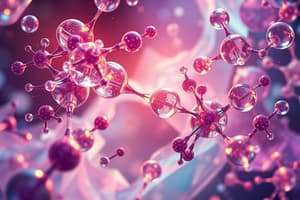Podcast
Questions and Answers
What is the aim of the Natural Products Chemistry course?
What is the aim of the Natural Products Chemistry course?
- To focus on the biosynthesis of synthetic products
- To provide an introduction to the broad field of Natural Products Chemistry (correct)
- To extract, isolate, and purify simple products derived from animals
- To review the major classes of synthetic compounds
What makes natural products different from synthetic chemicals?
What makes natural products different from synthetic chemicals?
- Synthetic chemicals are derived from plants, fungi, and bacteria
- Synthetic chemicals undergo addition, subtraction, substitution, and rearrangements
- Natural products are produced by the use of chemically reactive reagents
- Natural products are made by enzymes which can be much more selective (correct)
What are the sources of chemical compounds for natural products?
What are the sources of chemical compounds for natural products?
- Cells of organisms - plants, fungi, bacteria, insects, animals (correct)
- Synthetic chemical reagents
- Artificially engineered microorganisms
- Chemical precursors derived from inorganic sources
Which compounds are included in the biosynthesis knowledge covered in the course?
Which compounds are included in the biosynthesis knowledge covered in the course?
How are synthetic chemicals typically made?
How are synthetic chemicals typically made?
What is the primary way in which two isoprene molecules link to form terpenes?
What is the primary way in which two isoprene molecules link to form terpenes?
Which type of terpene is formed from six isoprene units?
Which type of terpene is formed from six isoprene units?
Which compound is NOT a triterpene?
Which compound is NOT a triterpene?
Which compound can be found in rose and other flowers?
Which compound can be found in rose and other flowers?
What is the common name for the compound CH3 CH CH3 CH3, found in oil of cloves?
What is the common name for the compound CH3 CH CH3 CH3, found in oil of cloves?
Flashcards are hidden until you start studying




